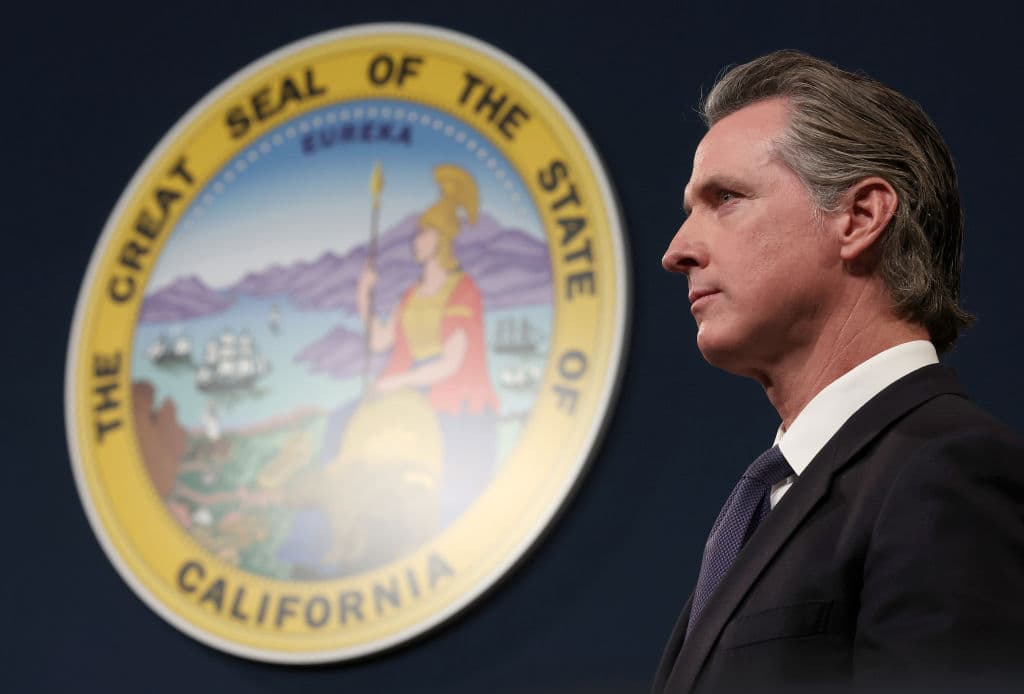Gavin Newsom’s About-Face on Reparations Could Cost Him the Presidency
Coast governor goes all wobbly over the recommendations of a task force that he himself appointed and now disavows — or not.

Gavin Newsom’s great leap onto the national stage has turned into a massive slip-and-slide. Just in recent days the telegenic governor of California put out a statement conspicuously disavowing reparation payments recommended by a task force he personally convened in 2020. It recommended reparations that would bankrupt the fiscally challenged Golden State and that risked making 94 percent of its residents furious.
Having enthusiastically lofted the reparations trial balloon, Mr. Newsom had no good choices. Endorsing the controversial payouts would have been political suicide for someone who is on every pundit’s shortlist to run for president in 2028 or even in 2024 just in case (wink, wink) President Biden fails to make it across the finish line.
Most Americans do not approve of payments to descendants of slaves to compensate them for historical wrongs. But, as Democrat Newsom contemplates a run for national office, this about-face will hurt him with Black voters and could deny him the nomination.
Mr. Newsom needs, like all Democrats hoping to survive a primary battle, to score well with African-Americans. During the 2020 primaries, Mayor Pete Buttigieg of South Bend, Indiana, was a front-runner, winning the Iowa caucuses, but crashed in South Carolina, despite spending more days and more money in that state than nearly anyone else. He failed to win over Black voters, and he was done.
African-Americans constitute but 13 percent of U.S. eligible voters, but their overwhelming support for Democrats gives them outsized influence. Some 92 percent of Blacks voted for Mr. Biden, helping to put him in the Oval Office; he has spent the past two years making sure they’ll do so again. Mr. Newsom jumped aboard the reparations train in the aftermath of the George Floyd riots and shortly after President Trump debated Mr. Biden in September 2020. The coast governor was outraged, he said, by Mr. Trump’s refusal in that forum to denounce white supremacist groups.
He also wanted to raise his national profile. To that end, he signed what his office called the “first-in-the-nation law to study and make recommendations on reparations for slavery to the Black community…” At that fraught moment of racial reckoning, support for reparations had moved higher, though it remained unpopular. In late 2020, a Washington Post survey found 31 percent of Americans backing the idea, including 18 percent of whites. That was markedly higher than in 1997 when a Post poll found only 19 percent of the country approved the concept.
The governor’s task force recently reported back, proposing that Blacks should be compensated for each of several injustices. As the New York Times reported, “a lifelong state resident who is 71 years old, the average life expectancy, could be eligible for roughly $1.2 million in total compensation for housing discrimination, mass incarceration and additional harms…” All in, CNN reported that California could owe $500 billion to $800 billion; the state’s budget amounts to $297 billion and will incur a deficit of $22.5 billion this year.
Californians were stunned. Since their state outlawed slavery in 1850, most did not imagine the tab would run so high. They also probably did not realize the task force would lump in “injustices” such as housing discrimination in the mid-1900s or mass incarceration and “health disparities” in this century.
The reparations push is not over. Legislators in California will likely propose a bill that encapsulates the panel’s recommendations. In addition to cash, the task force wants an apology for the “gravest barbarities carried out on behalf of the State,” which, according to one report, includes “the California Supreme Court’s enforcement of federal fugitive slave law through 1865, the coining of the term ‘welfare queen'” by California’s former governor, Ronald Reagan, “and the continued underrepresentation of African-Americans in the medical field.”
Plenty of questions remain, such as who is eligible for the payments. Despite the governor’s claim that California’s gold rush was built on slave labor (which is news to many), the task force broadened those who might apply to not only the descendants of slaves but also of any “free Black person living in the United States prior to the end of the 19th century.”
The form of potential compensation was also contentious, with some members of the task force evidently endorsing housing grants or tuition payments; ultimately, they concluded that cash would work best. Mr. Newsom disagrees. In a statement, the governor said, “Dealing with legacy is about much more than cash payments.”
For Black voters nationwide, the vast majority of whom endorse reparations, Newsome has gone from the Democrat most likely to lead the charge to just another politician running for cover. One civil rights activist, the Reverend Amos Brown, who was vice-chairman of the reparations task force, described the governor’s position as “disingenuous.”
Stung by criticism over his wobbling, Mr. Newsom’s office put out a “clarifying” statement, saying he is not ruling anything out. Actually, he may have just ruled himself out … of running for president any time soon.

